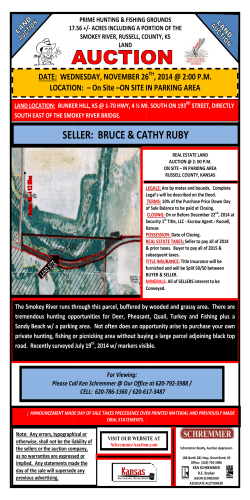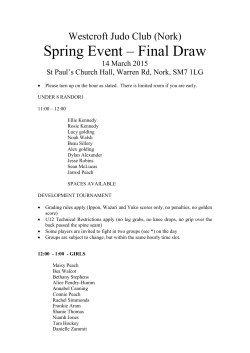
Asssignment Schedule #3
PHIL 387, Assignment Schedule #3 A10: In themselves, all the parts of McCulloch’s chapter 3 are of ordinary difficulty; but the “ebb and flow” of the debate may be difficult to follow. Read over the chapter once, and then pp. 67‐74 more carefully. Respond to the following: 1) Correlate McCulloch’s section numbers to the following outline: I. The modal and psychological arguments were supposed to show that even referring definite descriptions and proper names are not Proper Names. But these are far from decisive. II. But there is another way to argue that even referring definite descriptions and proper names are not Proper Names. This argument is based on propositional and epistemic factors. A. Russell attemptes to beat it by an attack on the epistemic factor. 1. Statement and exposition of Russell’s view. 2. Rejection of Russell’s reply. B. Strawson attempts to beat it by an attack on the propositional factor. 1. Statement and exposition of Strawson’s view. 2. Discussion and evaluation of Strawson’s reply. C. Conclusion: The argument for “spread” of the Basic Problem remains intact. 2) Consider Russell’s modal/psychological attempt to divorce definite descriptions and proper names from Proper Names (discussed in Ch 2). What problem does McCulloch find for this argument in §21? 3) What are the epistemic and propositional factors? How do they work together to “spread” the Basic Problem? A11: Reread McCulloch 75‐84. Then respond to each of the following. 1) Explain Russell’s “official view.” What kinds of things are we acquainted with? What kinds of things can we Name? How is this supposed to beat the expanded version of the Basic Problem? 2) McCulloch suggests that Russell’s official view fails as a response to skepticism. Why? Who do you think is right? Why? 3) Setting skepticism to the side, McCulloch suggests that Russell’s attempt the beat the Basic Problem is incoherent. How so? (Hint: What kinds of things do his quantifiers range over? What kinds of things does he think we can Name? How does this fit with the Commitment Claim?) 1 A12: Reread McCulloch, 84‐87 and GK 108‐135 (Strawson with Russell’s reply – though you should read them, don’t worry too much about Strawson’s sections IV and V). Then respond to each of the following. 1) McCulloch distinguishes sentences from statements. Strawson himself distinguishes between sentences, uses of sentences, and utterances of sentences. What are these distinctions, and how do they correspond to one another? 2) Explicate Strawson’s attack on Russell. That is, (i) explicate Strawson’s attack on the Propositional Factor and (ii) say something about why this matters for the extended version of the Basic Problem. 3) Russell seems to think that Strawson’s argument depends on egocentricity (on, e.g., ‘present’ in ‘the present King of France is bald’). Do you agree ─ do you think Strawson’s considerations apply equally to ‘the 1905 King of France is bald’? Explain. A13: Reread McCulloch 87‐100. Then respond to each of the following. 1) Against the charge that he confuses sentences and statements, McCulloch gives Russell a reply against Strawson. What is it, and how does it work? 2) According to McCulloch, Strawson might be forced to “write off” certain statements from a logical point of view. Why? What does McCulloch think is wrong with this suggestion? 3) From reading and lecture, how might the Fregean counterattack? Do you think this response is effective? Explain. 2
© Copyright 2026









